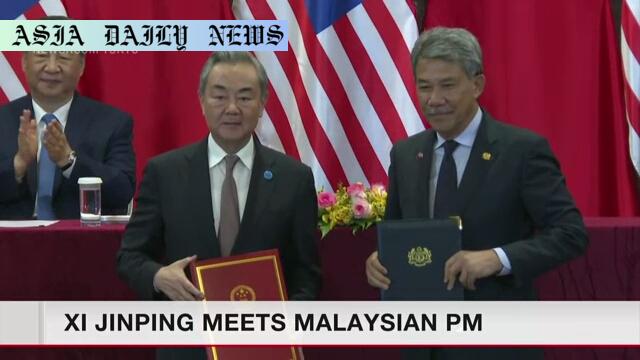China-Malaysia Relations: Xi and Anwar aim to boost strategic partnership to foster regional prosperity amid global trade challenges.
Chinese President Xi Jinping meets with Malaysian PM Anwar in Kuala Lumpur.
Discussions focus on strengthening bilateral ties and ASEAN collaboration.
Addressing protectionism amid U.S.-China trade frictions.

Strengthening China-Malaysia Ties for a Shared Future
Chinese President Xi Jinping’s visit to Malaysia marks a significant milestone in strengthening bilateral relations with Prime Minister Anwar Ibrahim. Held at the official residence of the Malaysian prime minister in Kuala Lumpur, the meeting underscored strategic cooperation to tackle global trade challenges and promote mutual growth. With Malaysia’s pivotal role as ASEAN chair, this dialogue emphasized China’s commitment to fostering harmony and partnership within the Southeast Asian region.
The meeting comes amid escalating trade disputes between China and the United States. President Xi’s remarks about unilateralism and protectionism mirror his resolve to create a multilateral framework that benefits regional cooperation over isolationist policies. This approach not only strengthens China’s economic position but also ensures that Southeast Asian nations can collectively face global trade pressures.
A Renewed Vision for ASEAN Collaboration
Beyond bilateral relations, the dialogue highlighted the importance of ASEAN as a unified bloc. Malaysia, under Prime Minister Anwar’s leadership, plays a critical role in shaping ASEAN’s agenda. President Xi reaffirmed China’s ambition to deepen its trade and economic ties with ASEAN, especially amidst growing reliance on the region as a trading hub. China’s trade volume with ASEAN surpasses that of the United States, underscoring the bloc’s significance in China’s economic strategy.
President Xi’s efforts to realign Malaysia-China relations serve as a template for broader collaboration with neighboring ASEAN nations, including Vietnam and Thailand. By proposing initiatives aimed at mutual economic growth, China aims to counterbalance the increasing trade tariffs imposed by the U.S. administration under Donald Trump.
Addressing Protectionism and US-China Trade Frictions
The U.S. levies on Chinese imports, soaring as high as 145 percent, cast a shadow on global trade. Many ASEAN nations also face similar pressures, with Cambodia, Vietnam, and Thailand subject to substantial tariffs. These hurdles accentuate the importance of partnerships like the China-Malaysia alliance. During his visit, President Xi underscored his readiness to align with ASEAN to combat these challenges through enhanced trade frameworks and collaborative decision-making processes.
As global economic policies lean toward protectionism, China’s diplomatic engagements signal its commitment to multilateral growth over competitive trade barriers. Partnering with ASEAN serves as a strategic move for China to mitigate the economic impact arising from U.S. trade restrictions, ensuring sustainable growth trajectories for nations within the bloc.
Conclusion
The Xi-Anwar meeting has set the tone for a strengthened China-Malaysia partnership, built on shared aspirations of prosperity and stability. With China’s steadfast support for Malaysia and ASEAN collaborations, the region is poised to navigate global trade challenges with resilience. These diplomatic efforts further position ASEAN as a significant player on the global economic stage while reinforcing China’s influence in the region. As the partnership evolves, it will be crucial to monitor how these engagements translate into concrete economic and strategic outcomes.
Commentary
Xi’s Visit: A Strategic Pivot in Geopolitical Dynamics
President Xi Jinping’s meeting with Malaysian Prime Minister Anwar Ibrahim signifies an important chapter in the landscape of ASEAN-China relations. At a time of heightened trade tensions with the United States, the dialogue underscores Beijing’s intent to deepen alliances within Southeast Asia. China’s strategy to counter protectionism and safeguard its economic interests hinges significantly on collaborative efforts with ASEAN members, making Malaysia a cornerstone of this regional strategy.
Malaysia’s Role as ASEAN Chair
As ASEAN’s current chair, Malaysia holds considerable sway in shaping collective priorities for the bloc. Anwar’s leadership plays a pivotal role in advancing regional stability and prosperity. Through this bilateral meeting, Malaysia reaffirms its position as a strategic partner to China while also amplifying its influence in ASEAN’s broader dynamics. Such dialogues not only cement Malaysia-China relations but also reinforce the unity of ASEAN in addressing external pressures.
Global Implications
The Xi-Anwar meeting serves as a microcosm of the broader geopolitical shifts taking place worldwide. With the U.S. imposing steep tariffs on Chinese imports and hinting at similar measures for ASEAN nations, China’s proactive engagement with its neighbors becomes critical to maintain balance. These relationships ensure an economic buffer against potential disruptions, allowing ASEAN nations to sustain growth and stability despite external challenges.
Conclusion
Overall, this meeting reflects a strategic pivot for both China and ASEAN nations like Malaysia. It highlights the interdependence of countries in achieving shared goals, particularly in an increasingly polarized global environment. Such alliances are not limited to trade but extend to shared visions of development and stability, marking an essential shift in regional cooperation amidst global uncertainties.


